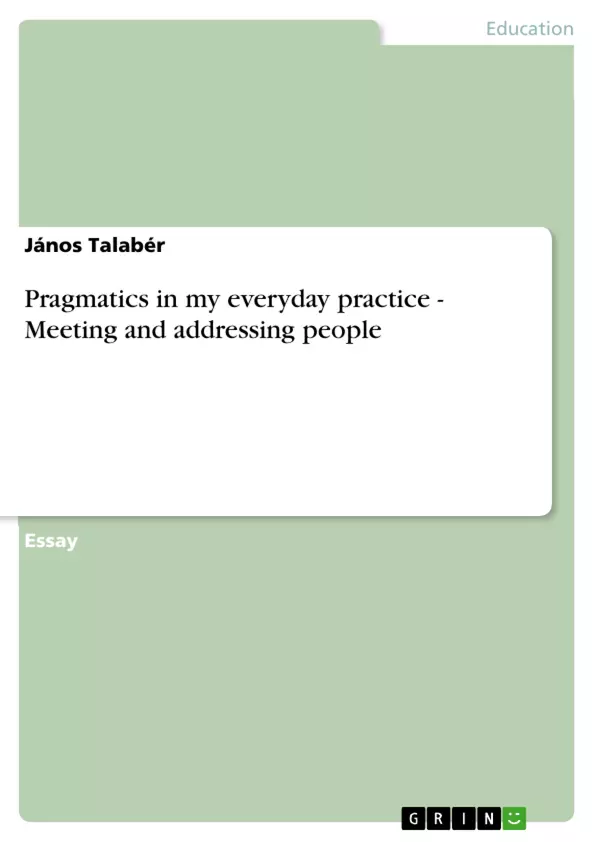This short piece of work would intend to show or present my everyday teaching practice from pragmatic points of view. I learned applied linguistics before, or at least my college professors gave it a try to teach me. I always wondered this miraculous linguistics, even if I had found it very hard to master. I am now making a research work on the linguistic differences between American and British English, hence I have been in love with US English since my childhood. Therefore, as my being a language examiner at one of the language examination boards, I am not only collecting pragmatic hints from my teaching practice, but I also would like to show some interesting points form the language exams. Moreover, I would really love to present some dialectical differences, which do inevitably utter pragmatics. For all this I have got to admit that an essay of some short pages could not fulfill the task to present every small bit of pragmatics, heedless of my honest efforts.
Inhaltsverzeichnis (Table of Contents)
- Addressing
- Names and titles
- Manner (politeness and impoliteness)
Zielsetzung und Themenschwerpunkte (Objectives and Key Themes)
This work aims to present the author's everyday teaching practice through a pragmatic lens, drawing on examples from language examinations and highlighting dialectical differences. The focus is on the practical application of pragmatics in communication, particularly in the context of English language teaching.
- Pragmatic implications of addressing individuals in English.
- The role of titles and names in conveying status and attitude.
- Variations in politeness strategies across different English-speaking contexts.
- The impact of context on meaning and interpretation.
- Challenges faced by students in understanding and applying pragmatic rules.
Zusammenfassung der Kapitel (Chapter Summaries)
Addressing: This section explores the lack of formal address forms in English compared to other languages and the resulting challenges for students. It discusses the misuse of terms like "Hello" and the complexities of formal vs. informal address. Examples are drawn from the author's teaching experience, highlighting common student errors.
Names and titles: This section examines the use of titles, first names, and last names in English to express status and attitude. It details common errors students make, such as using "teacher sir" or "mister teacher." The section also touches upon the cultural differences in addressing individuals.
Manner (politeness and impoliteness): This section provides examples of how context significantly impacts the interpretation of politeness. It illustrates how a seemingly polite phrase can be perceived as ironic or even impolite depending on the context and the relationship between speakers.
Schlüsselwörter (Keywords)
Pragmatics, English language teaching, politeness, address forms, titles, names, dialectical differences, context, communication, student errors, Anglo-American English.
Frequently Asked Questions
What is the focus of this work on pragmatics in teaching?
The work examines everyday English teaching practice through a pragmatic lens, focusing on how people address each other and the role of politeness.
What are common student errors when addressing teachers in English?
Students often make mistakes like using "teacher sir" or "mister teacher," failing to understand the specific pragmatic rules for titles and names in English.
How does English differ from other languages in formal address?
English lacks the distinct formal and informal "you" found in many other languages, which can lead to challenges for students in choosing appropriate terms like "Hello."
How does context affect the interpretation of politeness?
Context is crucial; a phrase that appears polite on the surface can be perceived as ironic or impolite depending on the speaker's relationship and the setting.
Are there dialectical differences in English pragmatics?
Yes, the author highlights differences between American and British English, which inevitably affect how pragmatic rules are applied and understood.
What role do names and titles play in communication?
They are used to express social status, professional hierarchy, and the attitude of the speaker toward the person being addressed.
- Quote paper
- János Talabér (Author), 2009, Pragmatics in my everyday practice - Meeting and addressing people, Munich, GRIN Verlag, https://www.grin.com/document/124489



